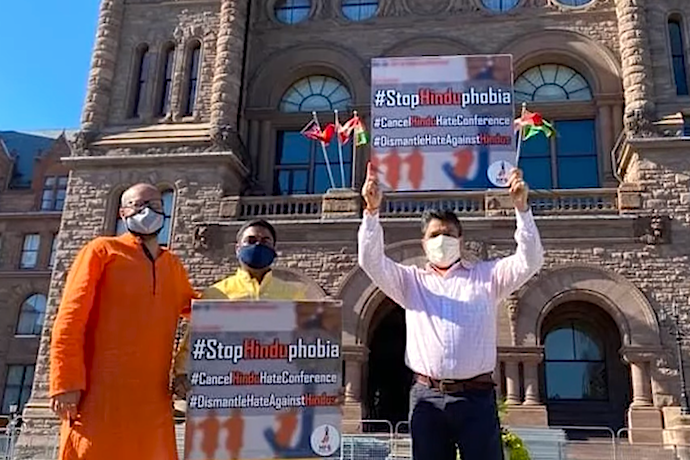by MANAN AHMED, ROHIT CHOPRA, & AUDREY TRUSCHKE

Though you aren’t likely to read about it on the front page of the New York Times or spot it in trending topics on Twitter, for over two decades now North America has had a Hindu Nationalism problem. Scholars in the US and Canada working in the areas of Hinduism, Indian politics, and South Asian history have been targeted in campaigns of harassment and intimidation by right-wing Hindu nationalists. And despite the fact that such attacks have escalated significantly in 2021 in both frequency and scale, most Americans remain unaware of this growing threat to academic freedom and know little about its anti-intellectual instigators. We, as members of the South Asia Scholar Activist Collective, seek to change that by publishing a timeline that tracks the harassment of South Asian academics in North America as part of a larger project we call the Hindutva Harassment Field Manual.
The assaults on academic freedom that we document are orchestrated by far right groups and individuals who promote the political ideology of Hindutva, or Hindu nationalism. Structurally, Hindutva is similar to other exclusionary ideologies, such as white Christian nationalism and Islamism. In India, proponents of Hindutva seek to transform the constitutionally secular republic into an ethnonationalist Hindu state that would privilege Hindus above other groups (especially Muslims and Christians, the two largest religious minority communities in India).
In North America, Hindutva advocates claim the exclusive right to speak for all Indians about South Asian history, Hinduism, and the rights of Indian religious minorities. Crucially, they also seek to control what should and should not be taught in North American schools, colleges, and universities about these topics as well as who should teach them. Hindu nationalists attempt to silence those they deem to imperil their majoritarian political and cultural ambitions. In recent years, North American scholars have been primary targets of US-based Hindu Right groups with calls to cancel classes, conferences, books, and teaching contracts.
Academics who research South Asia may seem like an unlikely target for political opposition. We’re a significant minority within the United States academy, which is dominated by the study of Western traditions and world areas. Many of us spend our days reading languages considered obscure by most Americans (like Persian, Sanskrit, and Urdu), and our battles in the academy usually focus on the urgent need to integrate the study of non-Western cultures, religions, and societies much more significantly into North American education. Yet, even as we attempt to broaden curriculums, we face increasing adversity as the Hindu Right seeks to undermine scholarly expertise in approaching Indian pasts.
The political ideology of Hindu nationalism is only about 100 years old, being originally inspired by fascist movements in early 20th-century Europe. Hindu nationalists, led by the paramilitary political association, Rashtriya Swayamsevak Sangh (of which the current Indian Prime Minister Narendra Modi is a member), imagine the Indian past as an era of Hindu glory that was destroyed by despotic Muslim conquerors. This vision trades in crude tropes and demonizes Muslims, who have participated in Indian cultures for well over 1,000 years and are subjected to increasing Hindutva violence in the 21st century. The Hindutva revisionist historical project seeks to rebrand Indian society as Hindu alone, akin to Christian nationalist ambitions in the United States.
Religion Dispatches for more
